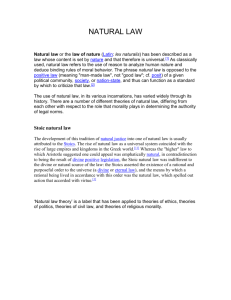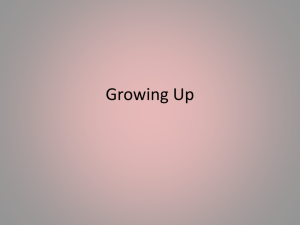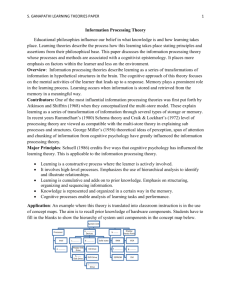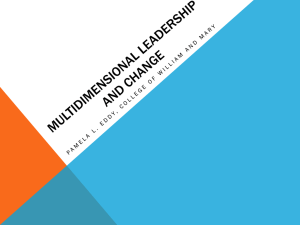Gender Roles
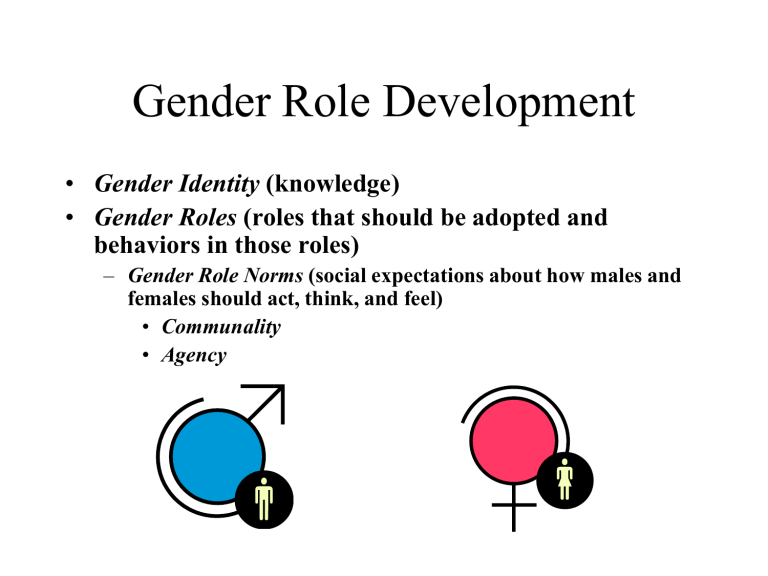
Gender Role Development
• Gender Identity (knowledge)
•
Gender Roles (roles that should be adopted and behaviors in those roles)
– Gender Role Norms (social expectations about how males and females should act, think, and feel)
• Communality
• Agency
Gender Role Development
• Gender Stereotypes (inaccurate, unsupported generalizations)
•
Gender Typing (process by which we acquire appropriate behaviors, thoughts, and feelings)
• Socialization (teaching)
Theories of Gender Role
Development
•
Biosocial Theory (Money and Ehrhardt)
– Biological Processes
–
Social labeling and differential treatment
Theories of Gender Role
Development
•
Psychoanalytic Theory (Freud)
– Oedipus Complex
–
Electra Complex
– Identification
Theories of Gender Role
Development
•
Social Learning Theory
– Observational Learning
–
Differential Reinforcement
Theories of Gender Role
Development
•
Cognitive Theories
– Kohlberg’s Cognitive Developmental Theory
•
Stage 1
–
Basic gender identity is established by age 2 or 3, when children can recognize and label themselves as males or females
Theories of Gender Role
Development
•
Cognitive Theories
– Kohlberg’s Cognitive Developmental Theory
•
Stage 2
–
By age 4, children achieve gender stability (gender remains stable over time; boys become men, girls become women)
•
Stage 3
–
Between ages 5 and 7, gender consistency is achieved (gender is stable across all situations; dress, cross sex activities, etc)
Theories of Gender Role
Development
• Cognitive Theories
–
Gender Schema Theory
• Children develop gender schema, about males and females that influence the kinds of information they will attend to and remember
Theories of Gender Role
Development
• Cognitive Theories
–
Gender Schema Theory
• Do this by:
– Developing an in-group, out-group schema to classify appropriate gender objects, behaviors and roles
– Developing an own sex schema, by acquiring more detailed info about their sex role
Developing Social Cognition
• Theory of Mind
–
Best taught by parents sharing their emotions
•
Role-Taking Skills
– The ability to adopt another person’s perspective and their thoughts and feelings in relation to our own
–
Theory of mind in action
–
Requires outgrowing egocentrism
Developing Social Cognition
• Begins with Mutually responsive orientation
–
Associated with best family situation for development of social cognition
– Children and caregivers are sensitive to and responsive to one another’s needs
–
Children want to comply to rules and learn self-regulation w/o external control
•
Empathy
–
Vicarious experience of another's feelings
–
Promotes morality and pro-social behavior
Developing Morality
•
Morality
–
Ability to distinquish between right and wrong
– Three components:
•
Affective
– Feelings which surround right and wrong actions (moral
affect)
• Cognitive
–
How we conceptualize right and wrong and make decisions
•
Behavioral
– How we behave when faced with moral dilemmas
Developing Morality
• Learn to distinguish between
–
Moral Rules
•
Standards that focus on the welfare and basic rights of others
–
Social Conventional Rules
•
Standards determined by social consensus about what is appropriate in particular social settings (rules of social etiquette)
•
Around age 11 start to try to explain why other people do what they do based on descriptions of internal characteristics
Developing Morality
• Taught through discipline
(Hoffman, 1970)
– Love withdrawal
•
Withholding attention, affection, or approval after a child misbehaves
– Power assertion
• Using power to administer spankings, taking away privileges, and other punishment
–
Induction
• Explaining why behavior is wrong and how it affects other people
Kohlberg’s Theory of Moral
Reasoning Development
•
Preconventional
–
Based on consequences
• Conventional
–
Based on approval and acceptance of others
– Internalizes societies rules
• Postconventional
–
Based on internalized personal moral code
– Acquired through formal operational thought
Invarient sequence
Cognitive growth and social experiences most important influences
Eisenberg’s Levels of Prosocial
Reasoning
• Stage 1: Hedonistic Orientation (up to age 7)
–
Self needs first
•
Stage 2: Needs Oriented Orientation (7 – 11)
–
Consider needs of others w/o guilt if help not given
Eisenberg’s Levels of Prosocial
Reasoning
• Stage 3: Approval-focused Orientation (11 – 14)
–
Will help if rewarded with praise and approval
•
Stage 4: Empathetic Orientation (12 and over)
–
Considers needs of others and feels guilt if not given
•
Stage 5: Internalized (16 and over)
–
Helping behavior based on strong, internalized beliefs and values
Developing Social Cognition
• Dodge’s Social Information Processing Model (pg 395)
– Encoding of cues
–
Interpreting of cues
– Clarification of goals
– Response search
– Response decision
– Behavioral enactment
